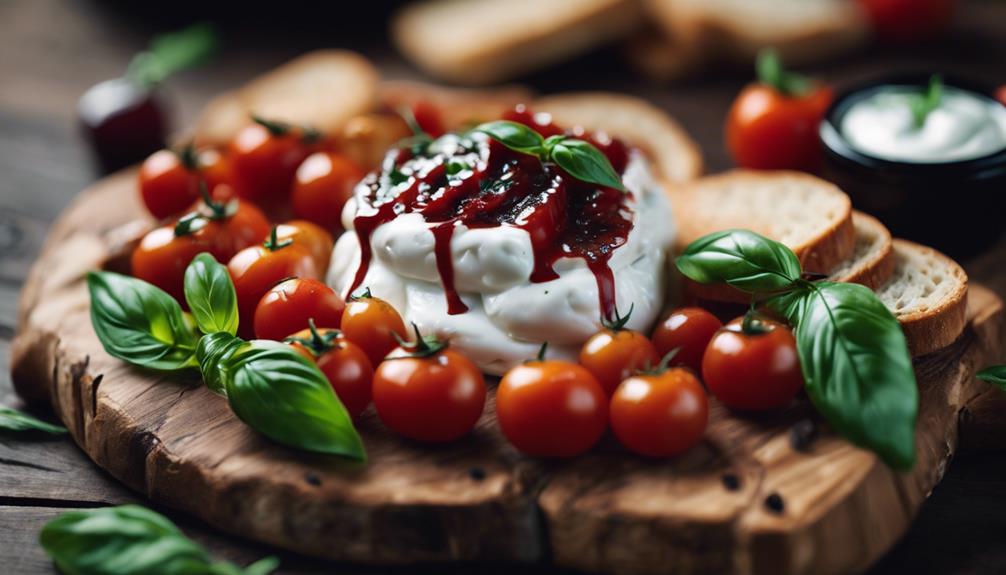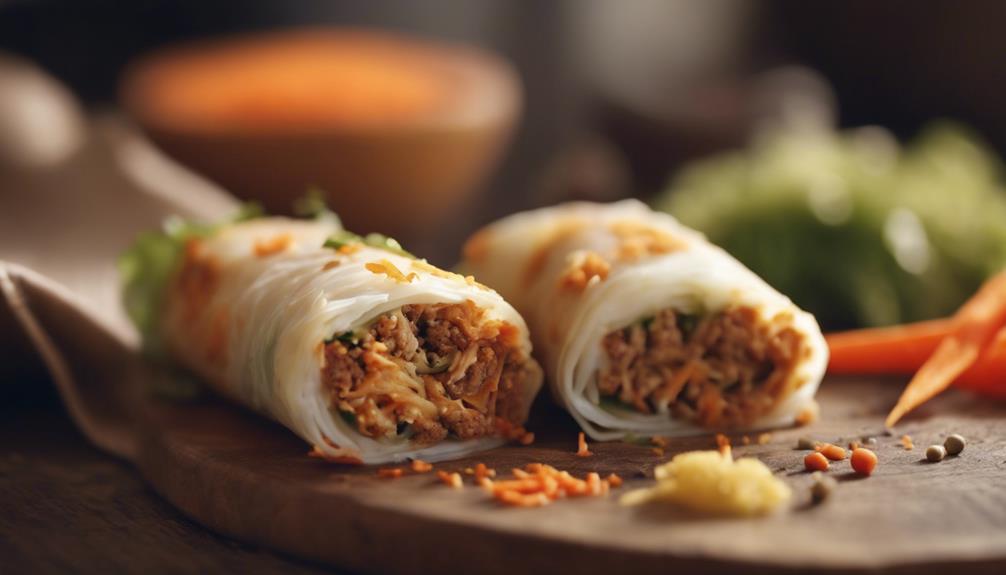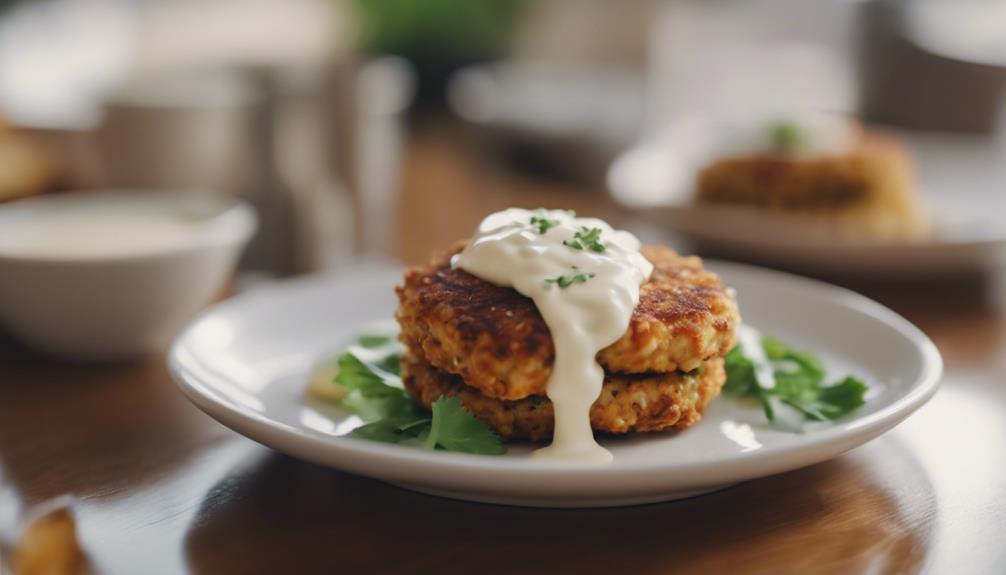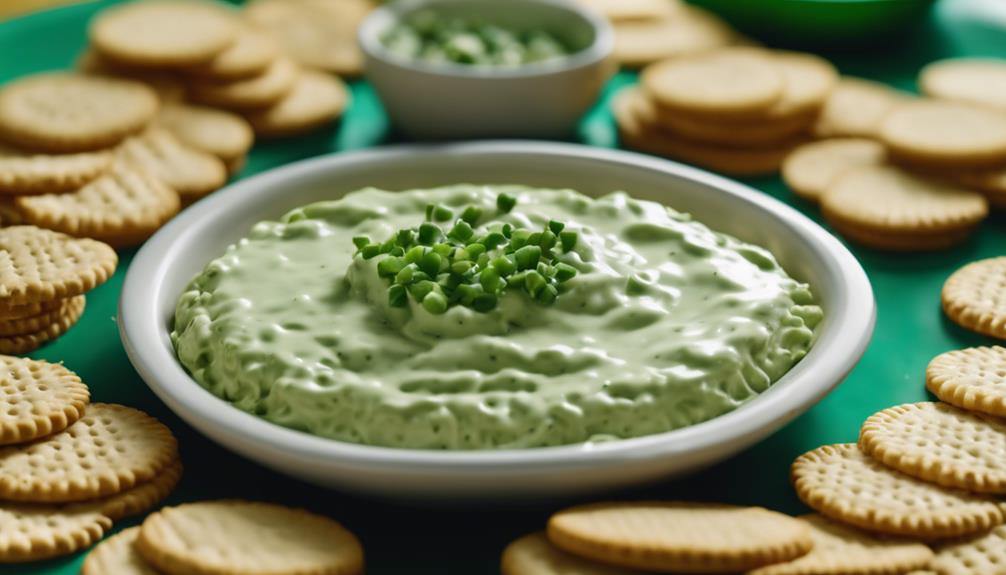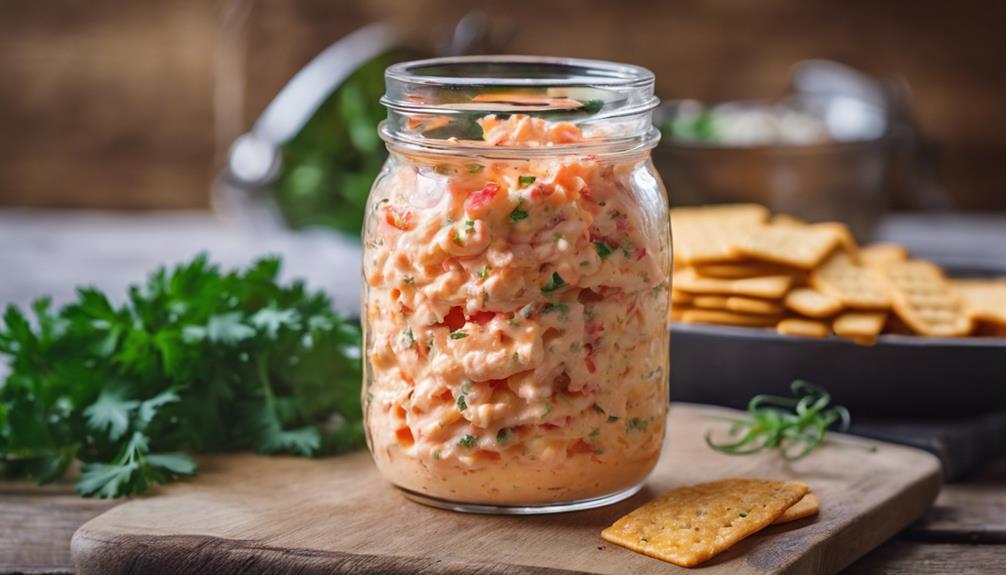Take your appetizer game to the next level with a delicious burrata dip. To start, gather fresh cherry tomatoes, creamy burrata cheese, fragrant basil, and high-quality olive oil. Slowly roast the tomatoes with garlic and Italian seasoning for a rich flavor. Drizzle sun-dried tomato oil and basil chive vinaigrette over torn burrata balls for an elegant touch. Top it off with fresh basil, salt, pepper, and red pepper flakes for a perfectly balanced blend of flavors. Serve in a shallow dish with crusty baguette slices. Feel free to experiment with different herbs, seasonings, or roasted garlic to make it your own. Impress your guests with this irresistible dish at your next gathering.
Key Takeaways
- Choose fresh burrata for a creamy texture and balanced filling ratio.
- Prepare jammy tomatoes by slow-roasting ripe cherry tomatoes with garlic and herbs.
- Drizzle tomato oil infused with sun-dried tomatoes for a rich flavor.
- Make a basil chive vinaigrette with high-quality olive oil and seasonings.
- Serve the dip with crusty baguette slices and garnish with fresh basil.
Ingredients for Burrata Dip
To make the delicious Burrata Dip, gather fresh cherry tomatoes, creamy burrata cheese, fragrant basil and chives, high-quality olive oil, and a crusty baguette.
The star of this appetizer is the creamy burrata cheese, a type of fresh Italian cheese made from a mix of mozzarella and cream. Its velvety texture and rich flavor make it a perfect base for the dip.
Roasting the cherry tomatoes intensifies their natural sweetness and creates a jammy consistency that complements the burrata beautifully. The combination of the tangy tomatoes with the creamy cheese is a match made in culinary heaven.
Adding fresh herbs like basil and chives enhances the overall aroma and taste of the dip, bringing a fresh and fragrant element to each bite. Drizzling high-quality olive oil over the burrata adds a luxurious touch, elevating the dish to gourmet levels.
Serving the dip with crusty baguette slices allows you to enjoy the creamy burrata with the burst of flavor from the jammy tomatoes in every bite.
Choosing the Perfect Burrata Cheese
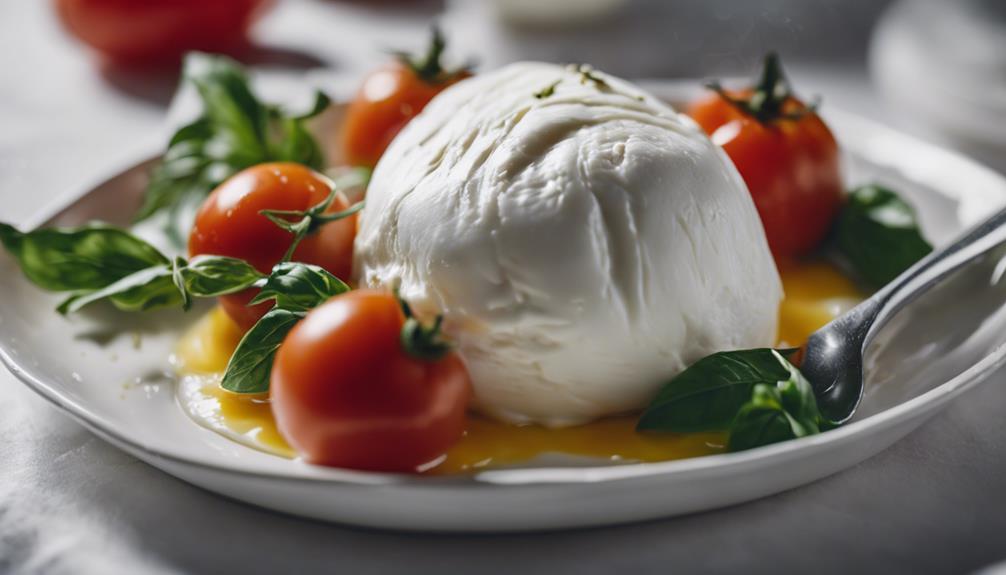
Considering the creamy texture and indulgent flavor of burrata cheese, selecting the perfect one for your dip is crucial to achieving a delectable outcome. When choosing the ideal burrata cheese for your gourmet appetizer, keep in mind the following tips:
- Check the Specialty Cheese Section: Look for burrata cheese in the specialty cheese section of your local grocery store or Italian markets. This is where you're more likely to find high-quality and fresh options.
- Inspect the Creamy Texture: Make sure that the burrata cheese has a creamy and luscious texture. The creaminess of the cheese is what sets burrata apart from other varieties.
- Look for Freshness: Opt for burrata cheese that's fresh. The freshness of the cheese contributes significantly to its rich flavor and luxurious mouthfeel.
- Examine the Creamy Cheese Ratio: A good burrata should have a balanced ratio of mozzarella to creamy stracciatella filling, providing a harmonious blend of textures.
- Ask for Recommendations: If you're unsure, don't hesitate to ask the cheese monger for recommendations on the best burrata options available. Their expertise can guide you towards a delightful choice.
Preparing Jammy Tomatoes
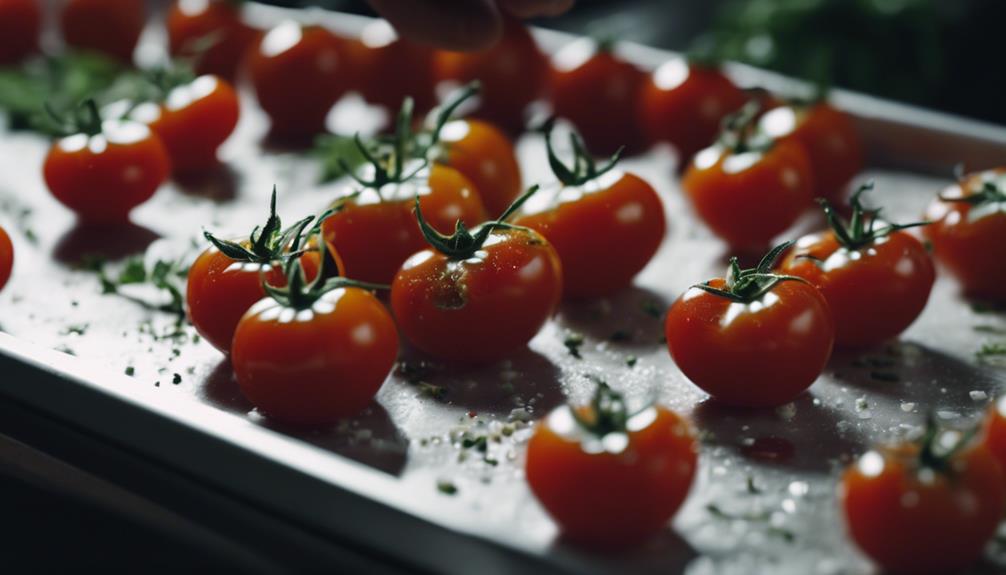
To prepare jammy tomatoes, select ripe cherry tomatoes for the best sweetness. Slow roast the tomatoes at 400F with garlic, Italian seasoning, and a drizzle of high-quality olive oil for a rich flavor profile.
The roasting process allows the tomatoes to soften, burst, and release their natural juices, enhancing their umami taste.
Tomato Selection Tips
When preparing jammy tomatoes for the burrata dip, remember to choose ripe cherry tomatoes for the best flavor and sweetness. To select the perfect tomatoes for your gourmet appetizer, consider the following tips:
- Opt for organic or locally sourced tomatoes for a more vibrant and fresh taste in the dip.
- Cherry tomatoes are ideal for roasting as they hold their shape well and caramelize beautifully.
- Look for tomatoes that are firm to the touch and have a deep red color for the best flavor in the dip.
- Select tomatoes that are evenly sized to guarantee even roasting and consistent flavor in the burrata dip.
- Fresh basil can complement the sweetness of the roasted cherry tomatoes, enhancing the overall taste of the dish.
Slow Roasting Technique
For best flavor and texture in your burrata dip, slow roasting cherry tomatoes at 400F with garlic, olive oil, balsamic vinegar, and Italian seasoning is key. This slow roasting technique enhances the natural sweetness and umami flavor of the cherry tomatoes.
By allowing the tomatoes to soften, caramelize, and burst, a rich and jammy consistency is achieved, adding depth and complexity to the flavor profile of the dip. The addition of garlic during the slow roasting process further elevates the taste, creating a luxurious experience when paired with creamy burrata cheese.
The balsamic vinegar contributes a tangy-sweet note that perfectly complements the decadent burrata. The slow-roasted cherry tomatoes with garlic provide a burst of flavor that harmonizes with the creamy texture of the burrata, making this gourmet appetizer a delightful treat for your taste buds.
Drizzling Tomato Oil
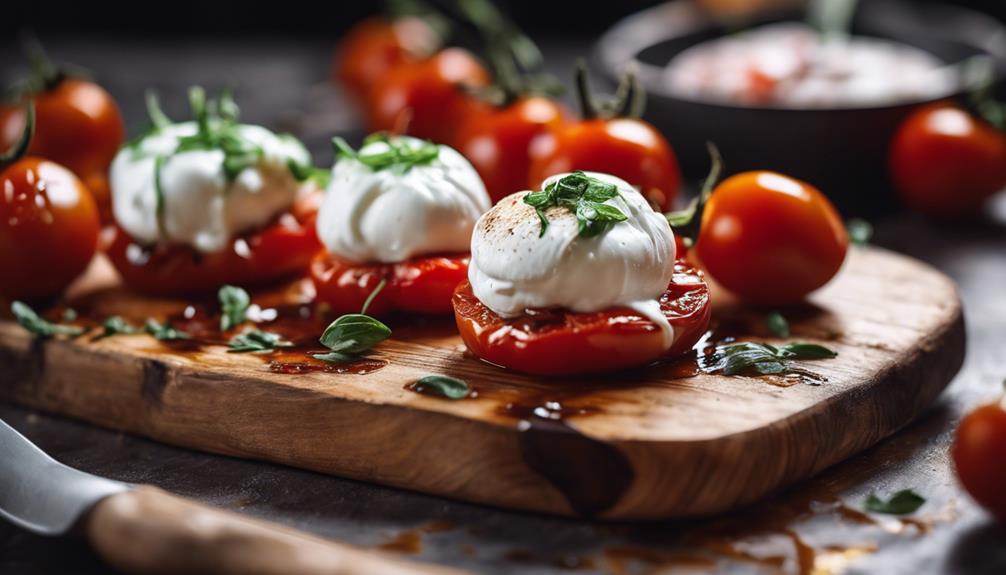
Drizzling tomato oil over your burrata dip not only enhances the tomato flavor but also adds a touch of visual appeal to your dish.
The concentrated essence of the tomato oil elevates the overall taste profile, creating a gourmet experience for your palate.
Infusing olive oil with sun-dried tomatoes yields a robust flavor that complements the creamy burrata and jammy tomatoes perfectly.
Enhancing Tomato Flavor
Enhance the sweet, tangy flavor of jammy tomatoes in your burrata dip by drizzling rich tomato oil over the creamy cheese. The tomato oil not only adds a rich, savory depth to the creamy burrata cheese but also creates a luxurious and gourmet taste experience.
To elevate the overall taste profile of your dip, using high-quality, flavorful tomato oil is essential. Here are some reasons why drizzling tomato oil enhances the tomato flavor:
- Intensifies the sweet and tangy notes of the roasted tomatoes.
- Complements the creamy texture of the burrata cheese.
- Adds a rich, savory depth to the overall flavor profile.
- Elevates the dip to a gourmet level.
- Creates a luxurious taste experience that will impress your guests.
Drizzle for Visual Appeal
Adding a drizzle of aromatic tomato oil over your burrata dip not only enhances the flavors but also elevates its visual appeal with a burst of rich color and texture. The richness of the tomato oil complements the creamy burrata cheese, creating a harmonious blend of flavors that will tantalize your taste buds.
This drizzle of tomato oil not only adds a gourmet touch but also creates a beautiful presentation, making it a feast for both the eyes and the palate. To make tomato oil, you can infuse olive oil with sun-dried tomatoes and herbs, adding depth and complexity to the overall taste profile.
When you drizzle the tomato oil over the burrata dip with jammy tomatoes, you aren't just adding a finishing touch; you're enhancing the entire dining experience. The burst of flavor from the tomato oil will leave your guests impressed, turning a simple appetizer into a culinary delight.
Making Basil Chive Vinaigrette
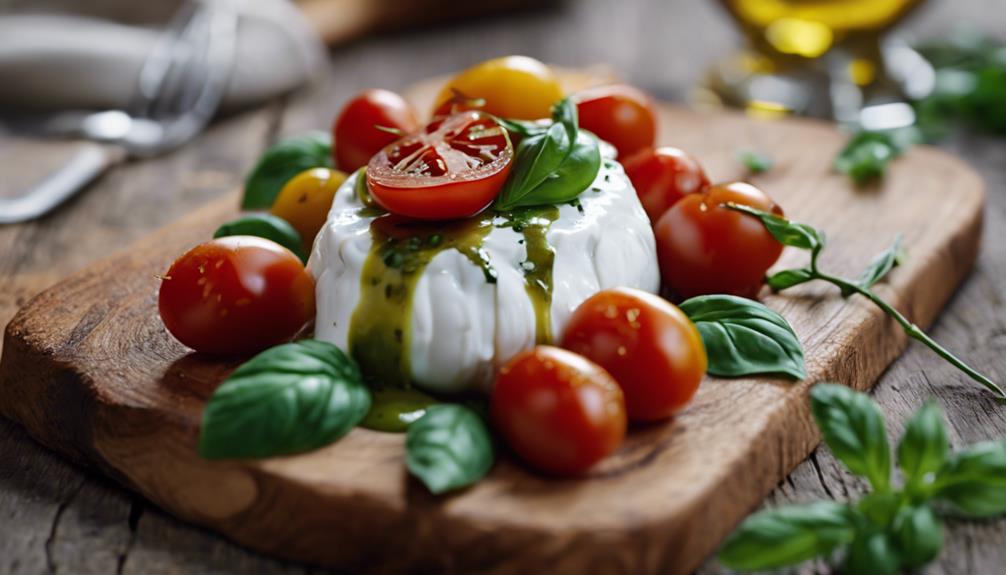
Blend fresh basil, chives, olive oil, garlic, lemon juice, and seasonings until smooth to create the flavorful basil chive vinaigrette for the burrata dip. This herbaceous dressing adds a burst of freshness to the creamy burrata, enhancing the overall taste experience.
Here are some essential points to keep in mind while making basil chive vinaigrette:
- Use high-quality olive oil: Opt for extra-virgin olive oil to guarantee a rich and robust flavor profile.
- Balance the garlic: Adjust the amount of garlic to your preference, ensuring it complements the other ingredients without overpowering them.
- Fresh lemon juice is key: Squeeze fresh lemons for the juice, as it adds a bright acidity that elevates the flavors of the vinaigrette.
- Season generously: Don't shy away from seasoning with salt and pepper to bring out the herb and citrus notes.
- Store in airtight containers: Preserve the vinaigrette's freshness by storing it in airtight containers in the refrigerator or freezer for future use.
Assembling Burrata Dip
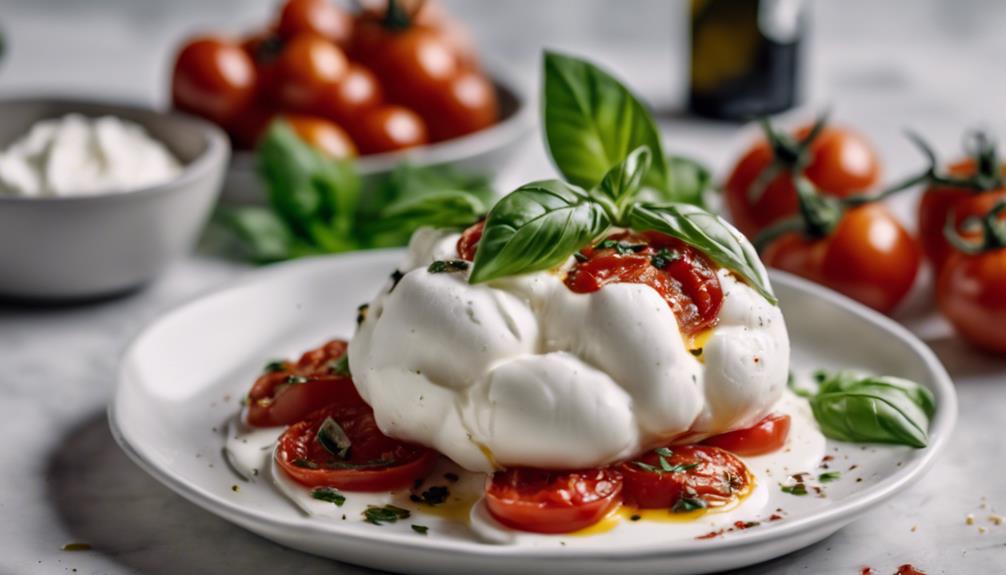
To assemble the Burrata Dip, tear open the burrata balls to reveal the creamy stracciatella inside. This fresh mozzarella is known for its indulgent and creamy texture, perfect for creating a rich and flavorful dip.
Once the burrata is exposed, drizzle some sundried tomato oil over it to enhance the cherry notes of the tomatoes. Add a generous amount of a basil sauce for an extra burst of fresh flavor. To elevate the taste further, season the dip with a pinch of salt and pepper.
These simple additions will complement the creamy cheese and juicy tomatoes, resulting in a harmonious blend of flavors.
The process of assembling this dip is straightforward and quick, making it an ideal choice for gatherings or parties where time is of the essence. By following these steps, you can create a delectable appetizer that pairs perfectly with toasty baguette or crispy crostini, offering a gourmet experience for all to enjoy.
Serving and Presentation Tips
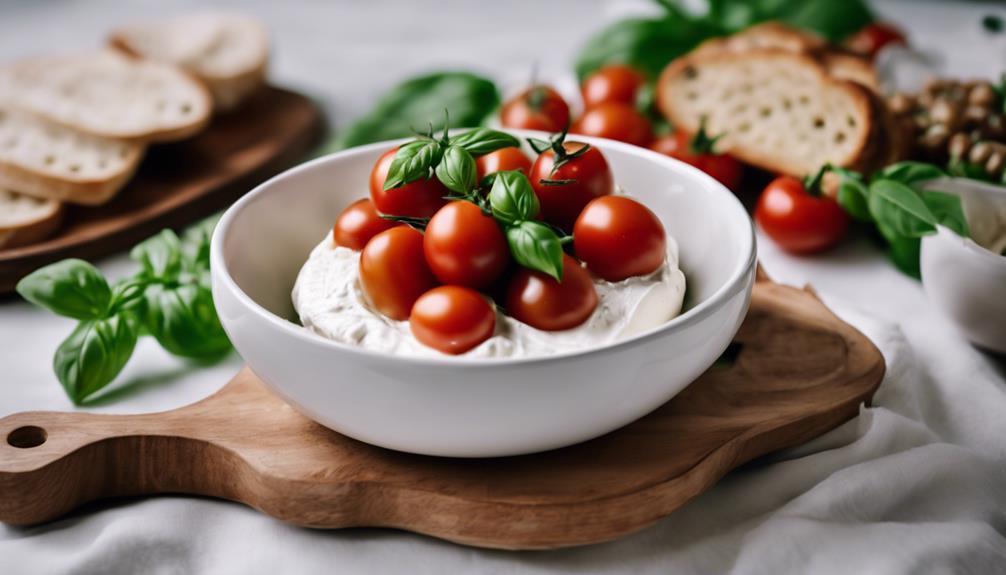
To enhance the visual appeal of the burrata dip with jammy tomatoes while serving it to your guests, consider the following tips:
- Garnish with Fresh Basil: Add a touch of color and freshness by sprinkling the dip with vibrant basil leaves.
- Arrange Toasted Baguette Slices: Surround the dip with thick slices of toasted baguette, ready for dipping.
- Use a Shallow Serving Dish: Opt for a shallow dish to showcase the creamy burrata and juicy tomatoes.
- Offer Small Spreading Knives or Spoons: Provide utensils for guests to scoop up the semi-soft Italian cheese and tomatoes onto their bread.
- Highlight the Mozzarella on the Outside: Make sure the outer layer of the burrata is visible, as it adds a delightful texture to the dish.
Variations and Recipe Customizations
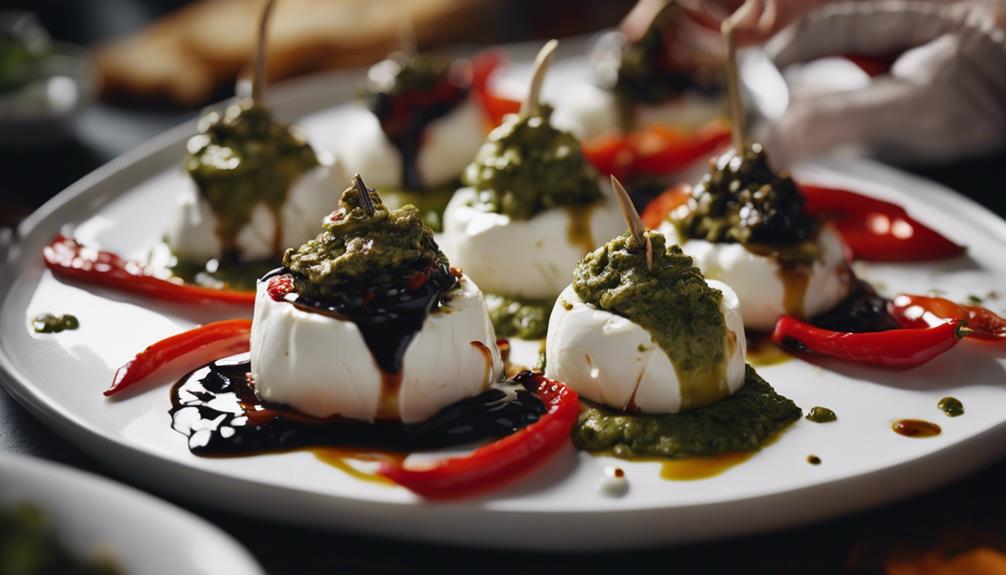
To elevate the flavor profile of your burrata dip with jammy tomatoes, consider experimenting with various herbs, seasonings, and additional ingredients for customizing the recipe to your taste preferences. Adding a touch of Italian seasoning can enhance the overall savory notes of the dish.
A pinch of salt and pepper, about 1/2 tsp each, can further elevate the flavors of the creamy burrata and juicy tomatoes. If you enjoy a hint of spice, consider incorporating a dash of red pepper flakes into the mix for a subtle kick.
You could also infuse the dip with roasted garlic for a robust flavor profile or caramelize onions to add a touch of sweetness. These variations allow you to tailor the burrata dip to suit your palate, creating a gourmet appetizer that reflects your unique preferences.
Experimenting with different ingredients can lead to discovering new favorite flavor combinations that will impress your guests and elevate your culinary skills.
Frequently Asked Questions
How Do You Eat Burrata Appetizer?
To enjoy a burrata appetizer, tear open the burrata balls to reveal the creamy center. Drizzle sun-dried tomato oil for extra flavor. Add basil sauce for a fresh taste. Season with salt and pepper, then serve with toasted baguette or crostini.
What Pairs Well With Burrata?
When thinking of what pairs well with burrata, think of sweet roasted cherry tomatoes, crusty bread for scooping, balsamic glaze drizzle, and fresh basil. A chilled glass of white wine or Prosecco complements this creamy delight perfectly.
What Is Burrata Cheese Used For?
Burrata cheese is used for creating decadent appetizers. Pair it with ingredients like basil, sundried tomatoes, or olive oil for rich flavors. Spread it on toasted baguette or crostini for a creamy delight.
Do You Eat Burrata With Crackers?
Do you eat burrata with crackers? Absolutely! They provide a crispy contrast to the creamy cheese. Choose plain or seasoned crackers for a delightful pairing. Experiment with various types for the perfect match. Enjoy this combo at parties or gatherings.
Can Whipped Ricotta Dip with Jammy Peppers Be a Substitute for Burrata Dip with Jammy Tomatoes as a Gourmet Appetizer?
Yes, the jammy peppers and whipped ricotta recipe can definitely be a gourmet substitute for burrata dip with jammy tomatoes as an appetizer. The creamy texture of whipped ricotta paired with the sweet and slightly spicy flavor of jammy peppers creates a delicious flavor profile that is sure to impress.
Conclusion
To sum up, this gourmet appetizer of burrata dip with jammy tomatoes is a delightful combination of creamy, tangy, and sweet flavors that's sure to impress your guests. Its vibrant presentation and explosion of flavors make it a must-have for any gathering, whether casual or formal. If you’re looking for more crowd-pleasing options, you might also want to try a curried peanut dip recipe, which offers a unique blend of spices and nuttiness. Together, these dips can create a versatile and unforgettable appetizer spread for any occasion. Both dips are remarkably simple to prepare, making them perfect for hosts who want to impress without spending hours in the kitchen. The combination of the burrata dip with jammy tomatoes and the curried peanut dip recipe brings a dynamic contrast of flavors and textures, appealing to a wide range of palates. These dishes not only taste amazing but also elevate the overall presentation of your appetizer table, leaving your guests raving long after the gathering ends.
With the perfect balance of textures and the freshness of the basil chive vinaigrette, this dish is a true crowd-pleaser.
So next time you want to elevate your appetizer game, give this recipe a try and watch as it disappears before your eyes, leaving everyone craving for more.
